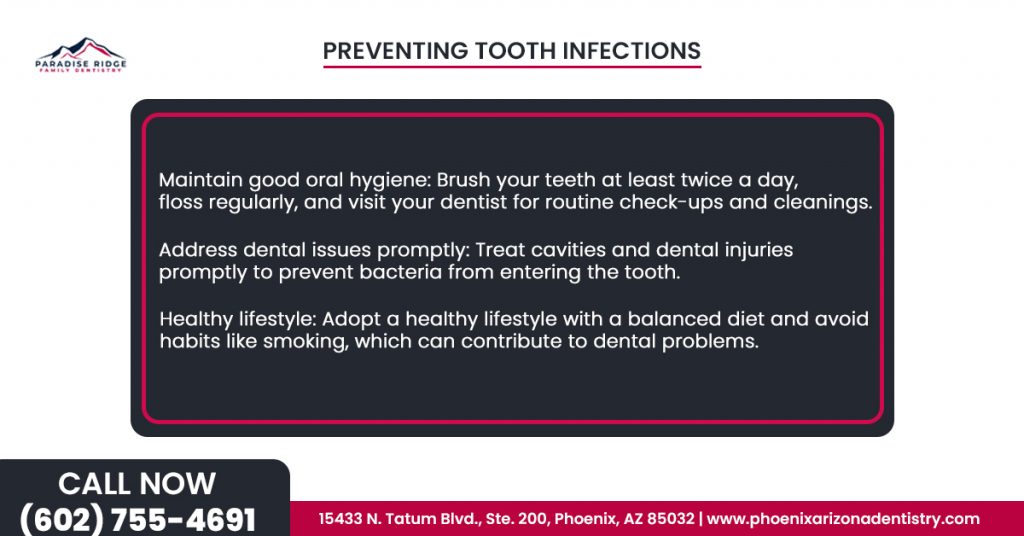Tooth infections may not initially seem like a big deal, but they can have serious consequences for your health. In the realm of oral health, amidst well-known concerns such as cavities and gum disease, there lurks a silent threat often underestimated – tooth infections. Despite seeming harmless, this issue can escalate into a serious condition if left untreated. In this blog, we’ll simplify things, covering the signs of a tooth infection, explore whether it can be life-threatening, discuss when it becomes an emergency, and offer valuable insights on prevention. Let’s explore tooth infections together, where awareness acts as the shield for your dental and overall well-being.
Table of Contents
Understanding Tooth Infection
A tooth infection, also known as an abscessed tooth, occurs when bacteria enter the pulp, the innermost part of the tooth containing nerves, blood vessels, and connective tissue. This invasion can happen through a cavity, crack, or injury, leading to the formation of pus and inflammation.
Signs and Symptoms of tooth infection
Understanding the signs and symptoms of a tooth infection is crucial for early detection and prompt intervention. While a tooth infection may start as a seemingly minor discomfort, it can escalate into a serious condition if left untreated. Let’s delve deeper into the nuanced signs of a tooth infection
1. Persistent and severe toothache
The hallmark sign of a tooth infection is a persistent and severe toothache that may worsen with time. The pain may be throbbing, constant, or sharp, indicating inflammation within the tooth.
2. Swelling in the face or cheek
As the infection progresses, swelling may occur in the face or cheek on the affected side. The swelling is often accompanied by redness and can extend to the jawline.
3. Sensitivity to hot or cold temperatures
Increased sensitivity to hot or cold temperatures is a common early indicator of a tooth infection. Discomfort may be experienced not only during consumption but also as a lingering pain after exposure to temperature extremes.
4. Fever
A tooth infection can trigger a systemic response, leading to the development of a fever. Monitoring your body temperature is essential, as an elevated fever may indicate the infection is spreading beyond the tooth.
5. Foul taste in the mouth
Pus accumulation in the infected tooth can result in a foul taste in the mouth. Patients often describe the taste as unpleasant and may experience bad breath as well.
6. Swollen lymph nodes in the neck
In advanced stages, the infection may cause swelling in the lymph nodes of the neck. This can be felt as tender, enlarged masses under the jawline or along the sides of the neck.
7. Difficulty opening the mouth
As the infection progresses, swelling and inflammation can lead to difficulty in opening the mouth fully. This symptom, known as trismus, may make eating and speaking challenging.
8. Abscess formation
A tooth infection is considered a dental emergency if you experience severe symptoms such as intense and persistent pain, significant swelling in the face or jaw, difficulty breathing or swallowing, a high fever, or painful swollen lymph nodes in the neck. These signs suggest a potentially serious and rapidly spreading infection that requires immediate attention. If you encounter any of these symptoms, it’s crucial to seek emergency dental care promptly to prevent further complications.
Preventing Tooth Infections

Prevention is the key to avoiding the potentially serious consequences of a tooth infection. Here are some tips:
- Maintain good oral hygiene: Brush your teeth at least twice a day, floss regularly, and visit your dentist for routine check-ups and cleanings.
- Address dental issues promptly: Treat cavities and dental injuries promptly to prevent bacteria from entering the tooth.
- Healthy lifestyle: Adopt a healthy lifestyle with a balanced diet and avoid habits like smoking, which can contribute to dental problems.
In conclusion, safeguarding your oral health is crucial, and recognizing the signs of a tooth infection is the first step. At Paradise Ridge Family Dentistry in Phoenix, AZ, we emphasize the importance of timely dental care to prevent serious consequences. Don’t ignore any concerns; schedule a dental check-up today to ensure your oral health is in top condition. Take the initial step towards a healthier, infection-free smile with our expert team.
At Paradise Ridge Family Dentistry, we prioritize not only your oral health but also your comfort during dental visits. From waiting rooms to treatment areas, our expertise ensures a comfortable environment for everyone. Trust Paradise Ridge Family Dentistry for your dental care needs, where precision meets comfort. Book your appointment today and experience superior oral healthcare in a welcoming atmosphere.
Frequently asked questions
1. Can a tooth infection kill you?
While it is uncommon, a tooth infection can potentially lead to serious complications that may become life-threatening if left untreated. In some rare cases, the infection can spread to other parts of the body, leading to conditions like sepsis, which can be fatal. It is crucial to recognize the signs of a tooth infection, such as persistent and severe toothache, swelling, and fever, and seek prompt dental care to prevent complications.
2. When is a tooth infection considered an emergency?
A tooth infection is considered a dental emergency if you experience severe symptoms such as intense and persistent pain, significant swelling in the face or jaw, difficulty breathing or swallowing, a high fever, or painful swollen lymph nodes in the neck. These signs suggest a potentially serious and rapidly spreading infection that requires immediate attention. If you encounter any of these symptoms, it’s crucial to seek emergency dental care promptly to prevent further complications.
3. How can I prevent tooth infections?
Maintain good oral hygiene by brushing and flossing regularly, address dental issues promptly, and adopt a healthy lifestyle. Regular dental check-ups also play a crucial role in prevention.


